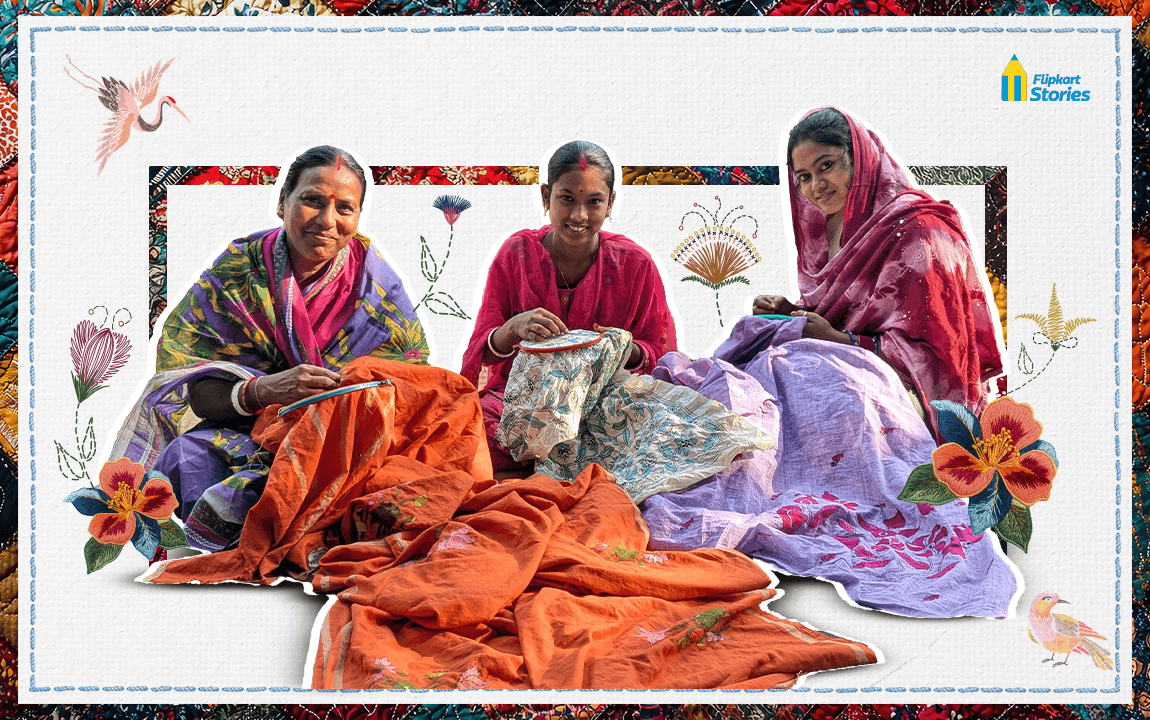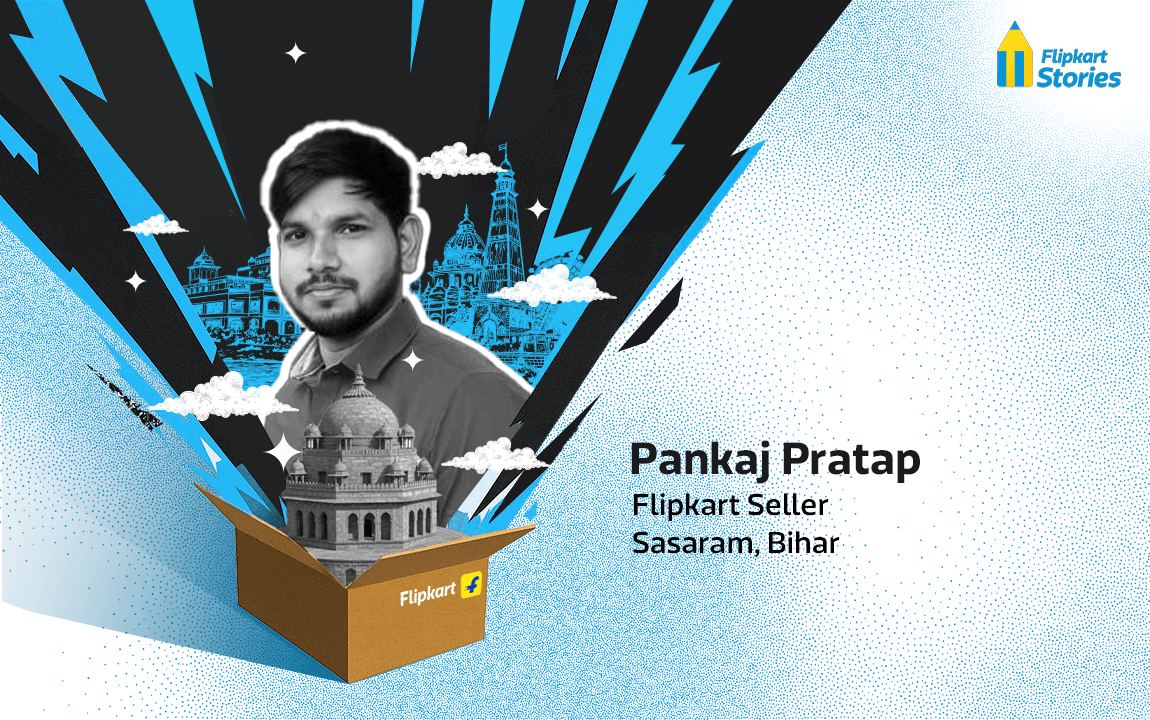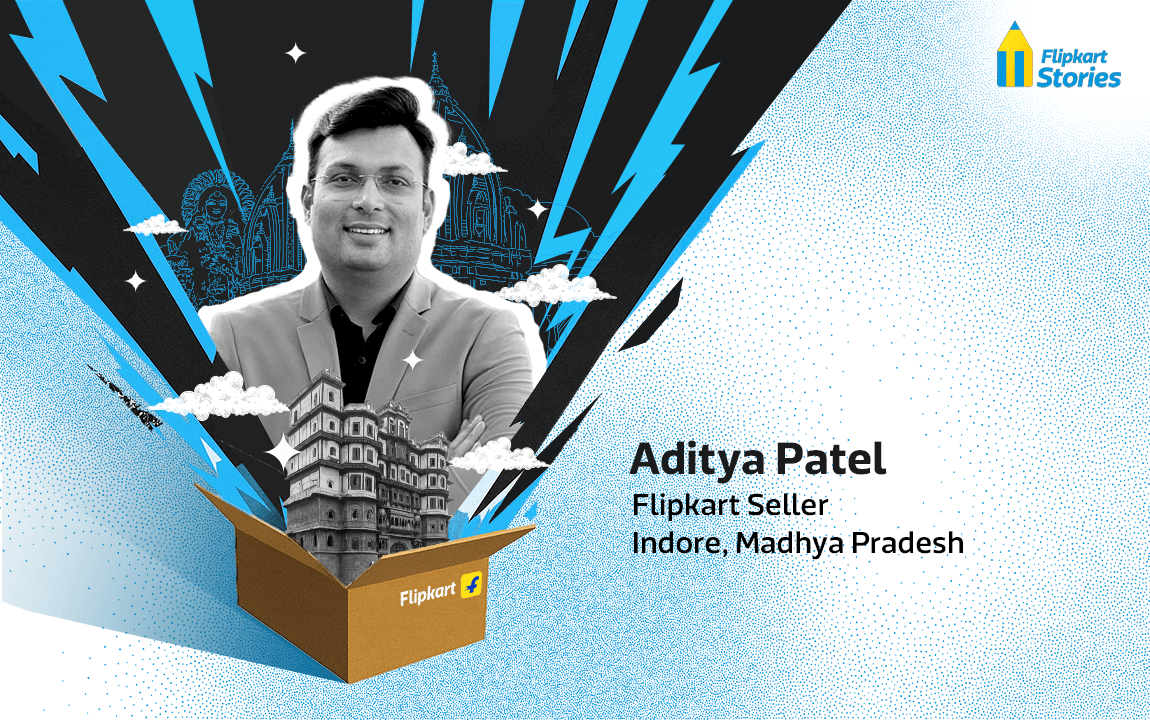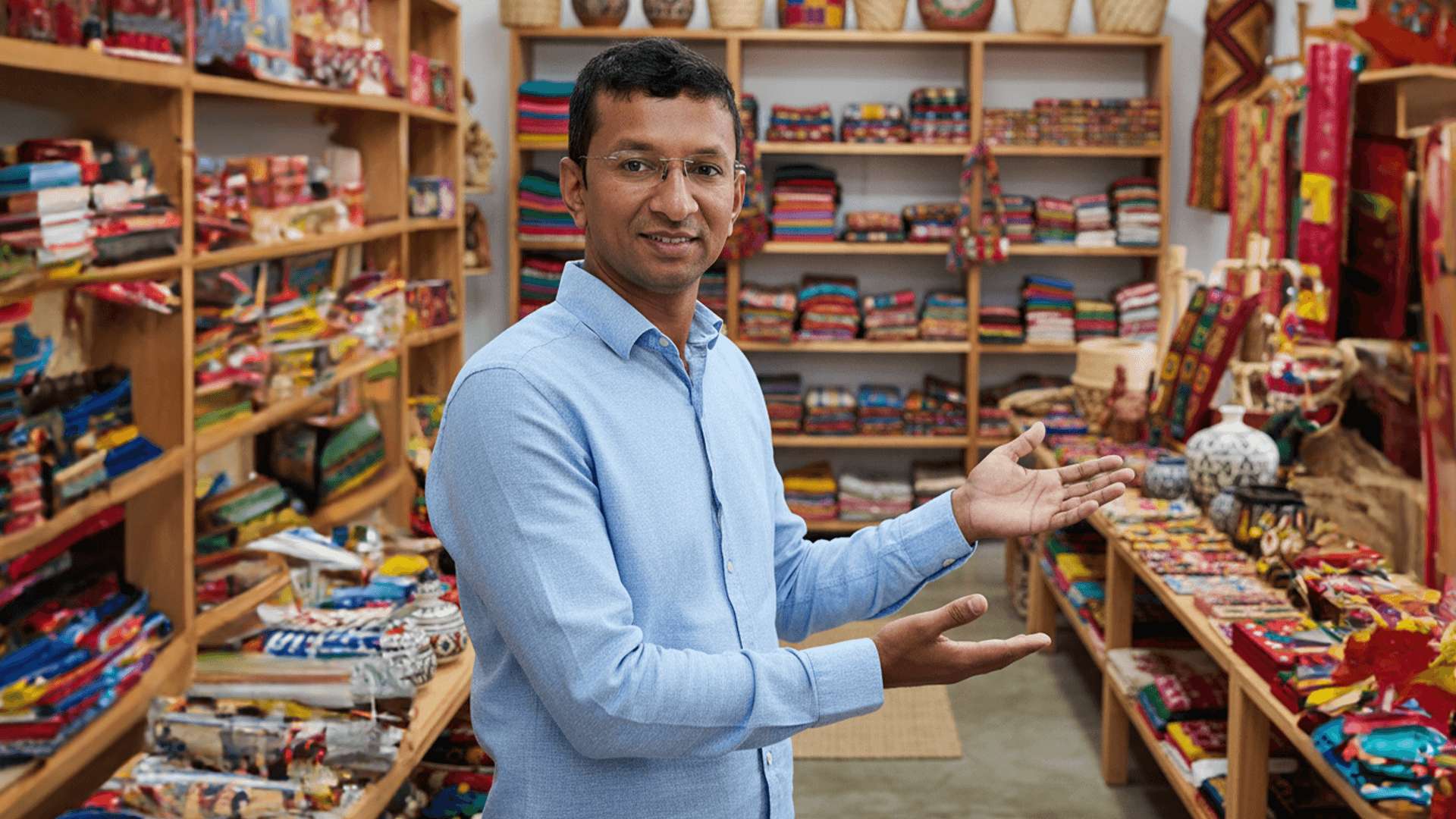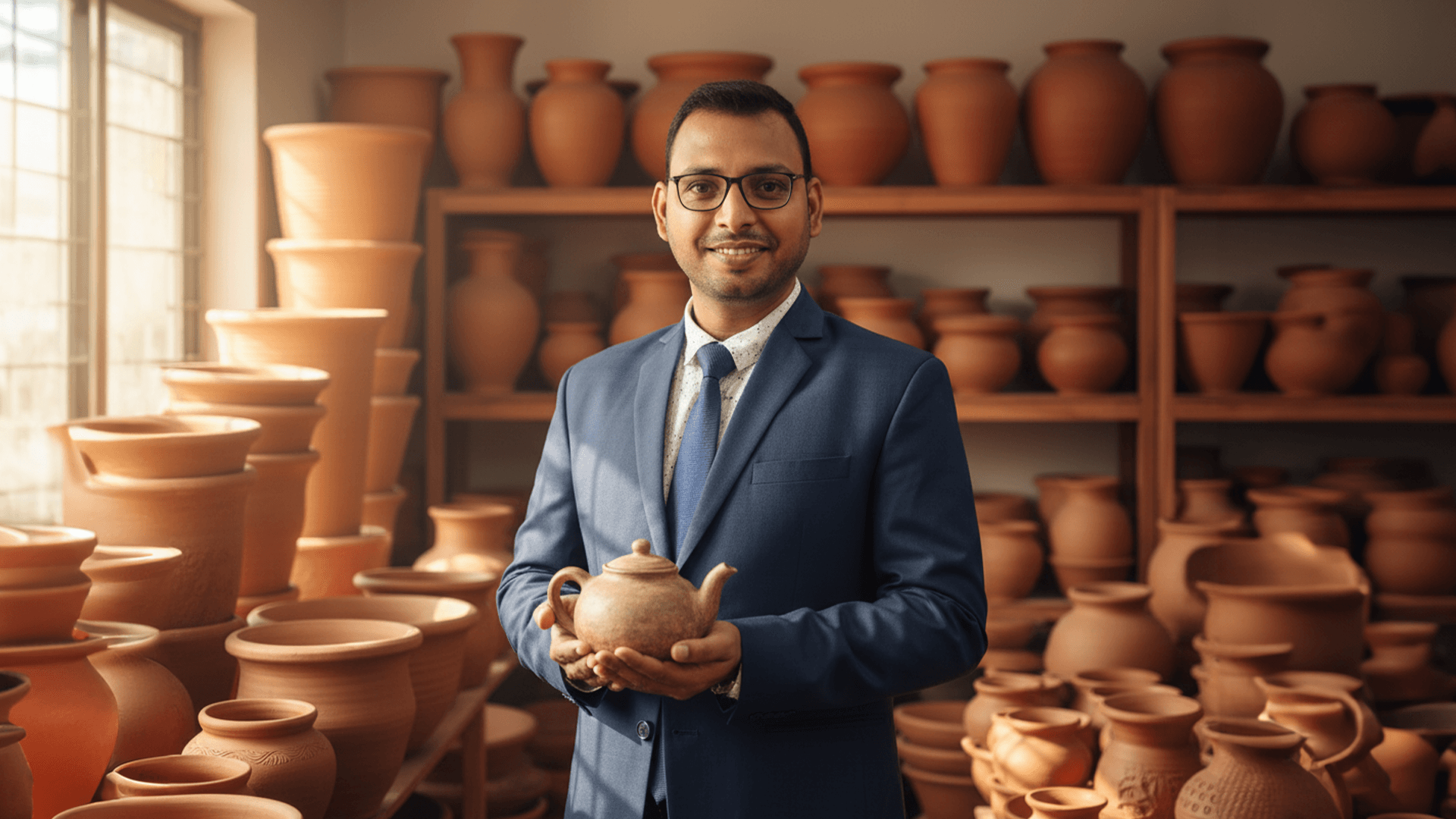Across India, artisans have kept traditional crafts alive for generations. Their skills, passed down through families, reflect the cultural identity of each region and continue to evolve with time. Yet, these artisans have often struggled against economic hardship. Lack of formal structures, understanding modern demand or reaching an audience outside their immediate vicinity are some of the key contributors.
Supporting these artisans aligns with the Flipkart Foundation’s commitment to improving market access to entrepreneurship, skill development and community empowerment as well as its other focus area of environmental responsibility.
One such initiative is the ‘Greening the Way Towards Success – Creating Sustainable Enterprises’ project, which seeks to revive traditional crafts while incorporating eco-conscious business practices with the objective of facilitating improved market access. A collaboration with AIACA (All India Artisans and Craftworkers Welfare Association), the project not only enhances skills but also enables access to wider markets.
A part of this initiative focuses on artisans skilled in Kantha stitching and zero-waste craftsmanship in Birbhum, West Bengal.
Flipkart Foundation X AIACA Collaboration: Leading Sustainable Change
Kantha, one of India’s oldest embroidery forms, originated in Bengal’s rural regions. Deeply rooted in cultural heritage, it has been a source of livelihood for many women artisans.
Over the past decade, the domestic market value of Kantha embroidery as well as its exports have grown steadily. But despite rising global demand and opportunities, women artisans in this craft still face challenges like limited access to markets, inadequate training and scarcity of minimum financial security.
As part of the AIACA and Flipkart Foundation partnership, these artisans are empowered through extensive training and capacity-building initiatives. Workshops on natural dyeing techniques, sustainable practices, product design and financial management equip artisans with the skills necessary to enhance the quality and marketability of their products. Furthermore, the collaboration facilitates market linkages, enabling artisans to access broader sales channels, thereby increasing their income and fostering a self-sustaining livelihood.
Read on to know how women artisans are leveraging this holistic approach to address market challenges while securing a sustainable future for their families and themselves.
Turning Thread into Opportunity
“I wanted to support my family, but I also wanted to create something beautiful,” says Alpana Sarkar. Born in West Bengal, Alpana’s journey into Kantha stitching was born out of necessity but soon transformed into passion. Married into a large family, she struggled financially, depending solely on her husband’s small shop.
To supplement their income, she started stitching and selling bedsheets and sarees, earning as little as ₹100 per piece. Everything changed when she joined the Flipkart Foundation’s program through AIACA. “The training refined my skills, and I started creating intricate designs that people truly valued,” she recalls.
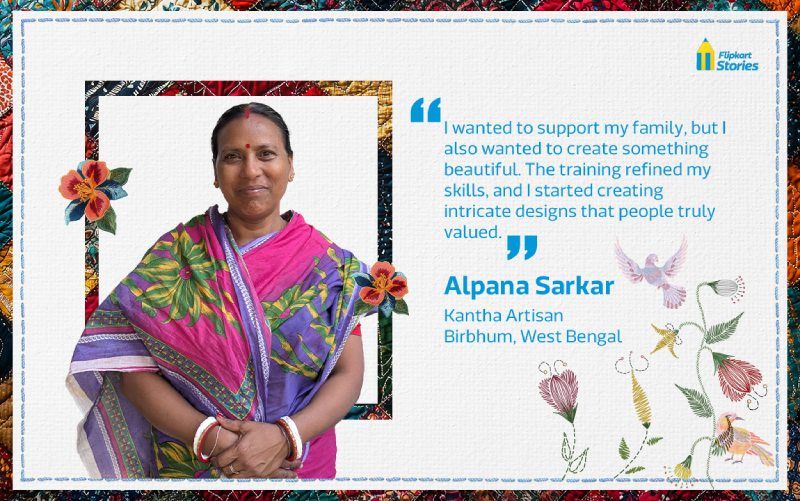
With better craftsmanship came better earnings — what once sold for ₹100 now fetches ₹1,100. Alpana takes pride in her floral motifs, a signature of her evolving artistry. The Flipkart Foundation and AIACA’s support helped her reach a larger audience, turning her embroidery into a sustainable income source.
Now, she dreams of expanding her craft, mentoring other women and seeing her designs in homes across the country. “I want to do more, create more, and see my art go further,” she says, her hands never pausing as she works on her next masterpiece.
Birds, Leaves and Stories
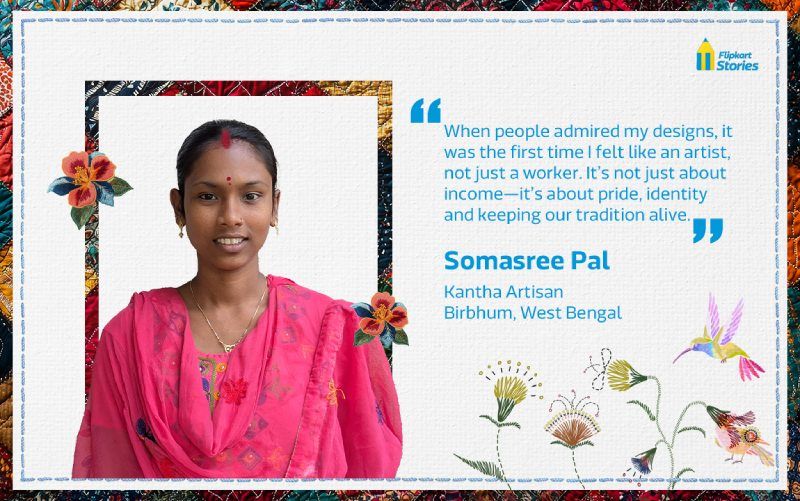
Hailing from a remote town in Birbhum, Somasree Pal grew up watching her mother’s hands deftly create intricate designs with needle and thread. “I used to watch my mother stitch for hours, mesmerized by how each thread told a story,” she recalls. By the time she was 12, she had picked up the skill herself, starting with small handkerchiefs before moving on to larger fabrics.
Inspired by tradition, she found her artistic identity in the detailed motifs of birds and leaves.
Her passion led her to the Flipkart Foundation-AIACA initiative, where she received structured training and exposure. “I love the idea of nature being woven into fabric, carrying a piece of our environment with us,” she explains.
Flipkart Foundation’s partnership with AIACA provided her an opportunity to showcase her work at exhibitions, and the response was overwhelming. “When people admired my designs, it was the first time I felt like an artist, not just a worker,” she says.
Balancing her art with motherhood, Somasree now works from home, stitching between caring for her five-month-old child. She has also embraced sustainable practices, crafting zero-waste products like mobile covers and home décor. “This work connects me to a community of women who uplift each other,” she says. “It’s not just about income—it’s about pride, identity and keeping our tradition alive.”
Kantha, Confidence and Independence
Nupur Khatun’s introduction to Kantha stitching began in school, where she was handed a handkerchief and asked to create a design. At the time, she didn’t realize that embroidery would shape her future. After marriage, her husband moved to Maharashtra for work, leaving her to manage the household alone. “I didn’t want to keep asking for money—I wanted to stand on my own feet,” she says.
Joining AIACA’s initiative was transformative. The training helped her sharpen her technique, making her stitches more precise and her designs more intricate. Birds became her favorite motif, symbolizing freedom and growth—values she holds dear. “Earlier, my work had no structure, but now my designs carry intention and skill,” she explains.
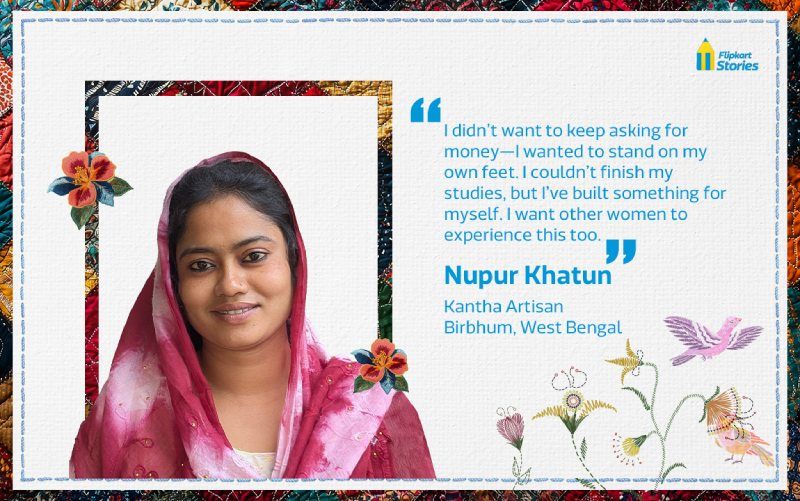
Nupur’s earnings from Kantha stitching now contribute significantly to her home. “From March to November 2024, I earned more than I ever imagined possible,” she says with pride. Flipkart Foundation and AIACA’s support has not only increased demand for her products but has also given her work the recognition it deserves. “When buyers admire my embroidery, I feel validated—it pushes me to do better,” she adds.
But for Nupur, the biggest victory is the independence her work has given her. “I couldn’t finish my studies, but I’ve built something for myself. I want other women to experience this too,” she says.
The Flipkart Foundation’s unwavering commitment to empowering artisans through skill development is not just about preserving heritage – it is also about equipping communities with the tools to thrive in evolving markets. By integrating traditional craftsmanship with modern business strategies, these interventions demonstrate how artisanal excellence can be both culturally and economically viable, ensuring that artisans are not just surviving but flourishing.
